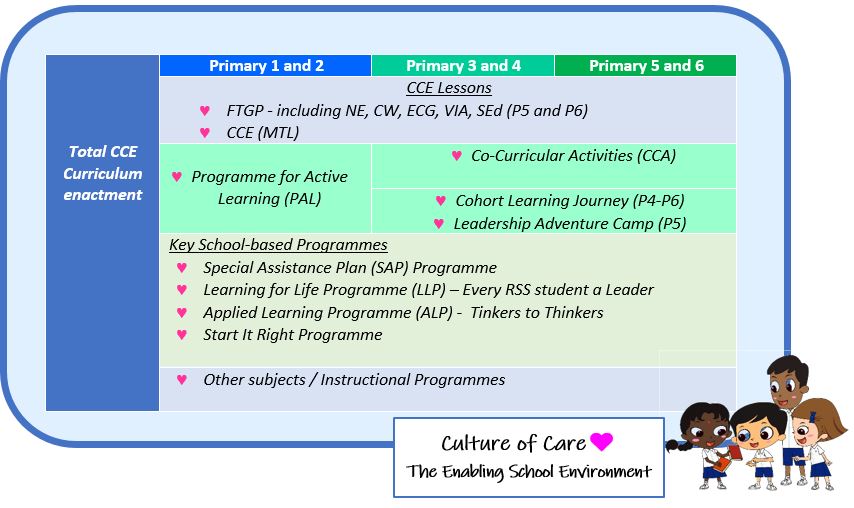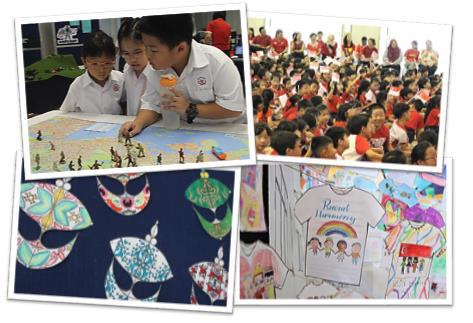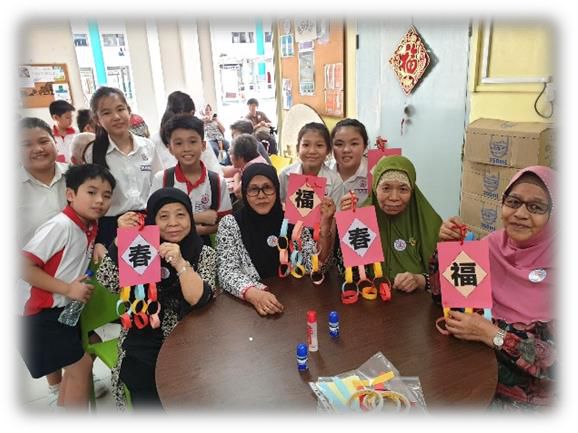品格与公民教育 Character and Citizenship Education
Key Programmes / Activities
Character and Citizenship Education (CCE) is an integral part of the education in Red Swastika School. Through CCE, students learn values, social-emotional competencies, and develop character and citizenship dispositions that facilitate their character growth during the formative years.
Every School Experience, a CCE Experience
Every school experience holds an immense possibility for our students to internalize the necessary values, attitudes and competencies. Hence, the school takes an integrated approach in the design of CCE as a total curriculum. This includes both the explicit curriculum as well as other educational experiences that our students go through, with each one of them reinforcing one another in a coherent and holistic manner.
Growing our RSS students through our Three Littles
To ensure consistency and synergy across the multiple learning contexts and experiences in the RSS CCE Total Curriculum, the school uses the ‘Three Littles’ of Little Master (小主人), Little Friend (小朋友) and Little Teacher (小先生) to anchor our character and citizenship development efforts.
Culture of care as the enabling school environment
We believe that a culture of care provides an enabling school environment for the enactment of our RSS Total CCE Curriculum. It is premised on positive relationships among staff and students where there is mutual respect, care and support for one another. In such a caring environment, our students cultivate dispositions of character and citizenship, and social-emotional well-being, as well as feel empowered to become the best versions of themselves.

Form Teachers Guidance Period (FTGP)
During FTGP, our form teachers (FTs) guide our students to develop social-emotional competencies, anchored on values and citizenship dispositions. Topics related to Cyber Wellness, Education and Career Guidance, National Education and Sexuality Education (for P5 and 6 only) are explored and discussed in a developmentally appropriate manner during the lessons.
FTs bond with students through interaction activities during the lessons. Positive teacher-student relationship is also cultivated through 1-to-1 Chit Chat sessions during FTGP lessons. Teachers get to know their students better through conversations and demonstrate their care for students as unique individuals.
CCE Lesson
As values are closely related to language and culture, Mother Tongue Language teachers make use of stories, songs and cultural practices to teach values during CCE lessons. These lessons provide students with opportunities to discuss and internalize the values in the cultural context.
National Education (NE)
 |
RSS commemorates four NE Commemorative Days every year – Total Defence Day, International Friendship Day, Racial Harmony Day and National Day. These events provide opportunities for students to deepen their appreciation of our shared past and Singapore’s current realities, and foster a sense of hope and belonging to Singapore. The learning of school values exemplified by the Three Littles is intentionally weaved into the events for reinforcement. In addition, the school also brings in the discussion of contemporary issues to deepen students’ knowledge of current affairs. |
Values in Action (VIA)
| VIAs are learning experiences that support our students’ development to becoming socially responsible citizens who can contribute meaningfully to the school and community. RSS students in the lower primary (P1 and P2) start their service journey from home by assisting family members with household chores. They continue to extend their services to school through structured platforms to keep the school environment clean. Students in the middle primary (P3 and P4) show their appreciation to different groups of stakeholders who have supported them in school while students in the upper primary (P5 and P6) offer their services to the community - packing and sending gift packs to the needy around the community, taking part in donation drives. |  |
Learning For Life (LLP) Character Lessons
 |
Teachers design and deliver the LLP Character lessons with intentionality. Adopting the spiral approach, students are taught the school vision, mission and values gradually and repeatedly, reinforcing the learning over time. Each lesson delivers rich content through various pedagogical approaches that are developmentally appropriate and engage students cognitively and affectively. To develop our students as reflective learners, they are given the opportunity to reflect on their learning at the end of every lesson. |
Cyber Wellness (CW)
CW education in RSS is delivered over multiple learning platforms – FTGP, school-based enrichment (SBE) lessons and Assembly. Lessons are designed to teach students to be respectful, safe and responsible users of technology and be a positive peer advocate for online safety.
Education and Career Guidance (ECG)
ECG is about equipping students with the necessary knowledge, skills and values to make informed decisions at each key education stage. Students explore their values, interests and personality. They also learn about occupational clusters and the type of skills required for these clusters. To broaden the learning experiences in ECG, the school also leverages the partnership with the Alumni Association for members to share about their real-life work experiences with our students.
Sexuality Education lessons are conducted for students at Primary 5 and 6. In SEd, students learn to understand the physiological, social and emotional changes they experience as they mature. They also gain a better understanding of how to develop healthy and rewarding relationships, as well as learn how to make informed and responsible decisions on sexuality matters.
RSS Character Affirmation Programme
| Our Character Affirmation Programme provides feedback to students on their character growth. It encourages our students to demonstrate the characteristics of the Three Littles. The school has put in place a student recognition structure which includes a 3-tiered Character Awards. Role models of the Three Littles from each class are nominated via the termly Class Affirmation Periods. |  |

